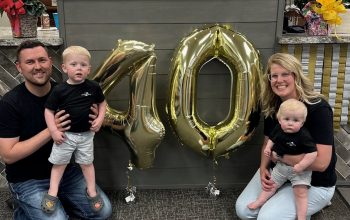Widowhood is wild. Loss is a real jerk in any circumstance, but in the case of spousal loss, nearly everything about the daily life of the remaining person changes—and even the things that aren’t directly affected are made different because the widowed person is, themselves, different. In my circumstance, my husband had a short and catastrophic illness, so over the course of three days, my life unraveled.
Some changes are immediately apparent. The emptiness and silence in a home-turned-reminder that your partner is gone. Replacing normal activities with the business of death, like planning memorial services and informing loved ones and concerned businesses and entities of the loss. The chores and jobs, once divided, now suddenly unified and laid into the widowed spouse’s trembling hands. These things become obvious, heavy, and all-encompassing right away.
Then, there’s the stuff that takes a while to become apparent. The changing interests, because once you’ve lost everything your hobbies and priorities change in unpredictable ways. What you once thought crucial becomes an afterthought, and the stuff you used to think inconsequential, workaday, and even irritating is actually precious, and among the most missed.
And what many people don’t talk about is what happens to your social life. I’m an introverted homebody, so I didn’t have a huge social circle before Troy died. Most of the time, his was the voice I heard first, last, and most frequently during the day. So, of course, that change is to be expected. What one may not expect is the friends who disappear because your life is their worst nightmare realized, and the people who turn their back on you because they cannot grasp the level of pain you’re feeling—or cannot understand why you’ve changed or may act unpredictably. Being ghosted by someone who said they’d be there for you no matter what, during precisely the time when you need them the most, is not something you predict as a byproduct of loss. It’s a whole other level of grief, at times just as excruciating as the loss of your person. Although, for them at least, there is still time to reconnect.
But, here’s the upside. New people come in that you never saw coming and some you’ve known, but have never been close to, step up and step in, showing up in your life in wholly unexpected and incredibly meaningful ways. These people are gifts the grieving don't expect. The fresh air of new friendships remind us that there are people who see your disaster of a life, and knowingly walk toward it. More than being people to depend on and delight in, they literally illustrate the reasons to go on during times when loss is just too heavy to bear.
There are losses upon losses in new widowhood, and losing your spouse is, sadly, the first of many. Remaking a life is hard and scary. But amidst all the loss there are also new blessings, new gifts, new opportunities, and new reasons to smile. It may take a while to start re-wiring and reworking what gets tangled, bent, and broken, but it does begin to happen. And I can tell you that the dents and cracks grief has made in my heart, along with the social restructuring of people removed and replaced, are also precisely what have started to allow new light to get in.
Sara Middleton is a freelance columnist and resident artist/owner of Studio Sol Gallery & Creative Space in Eagle Grove, Iowa. Email her at sara.studiosol@gmail.com or find Studio Sol on Facebook or Instagram.



